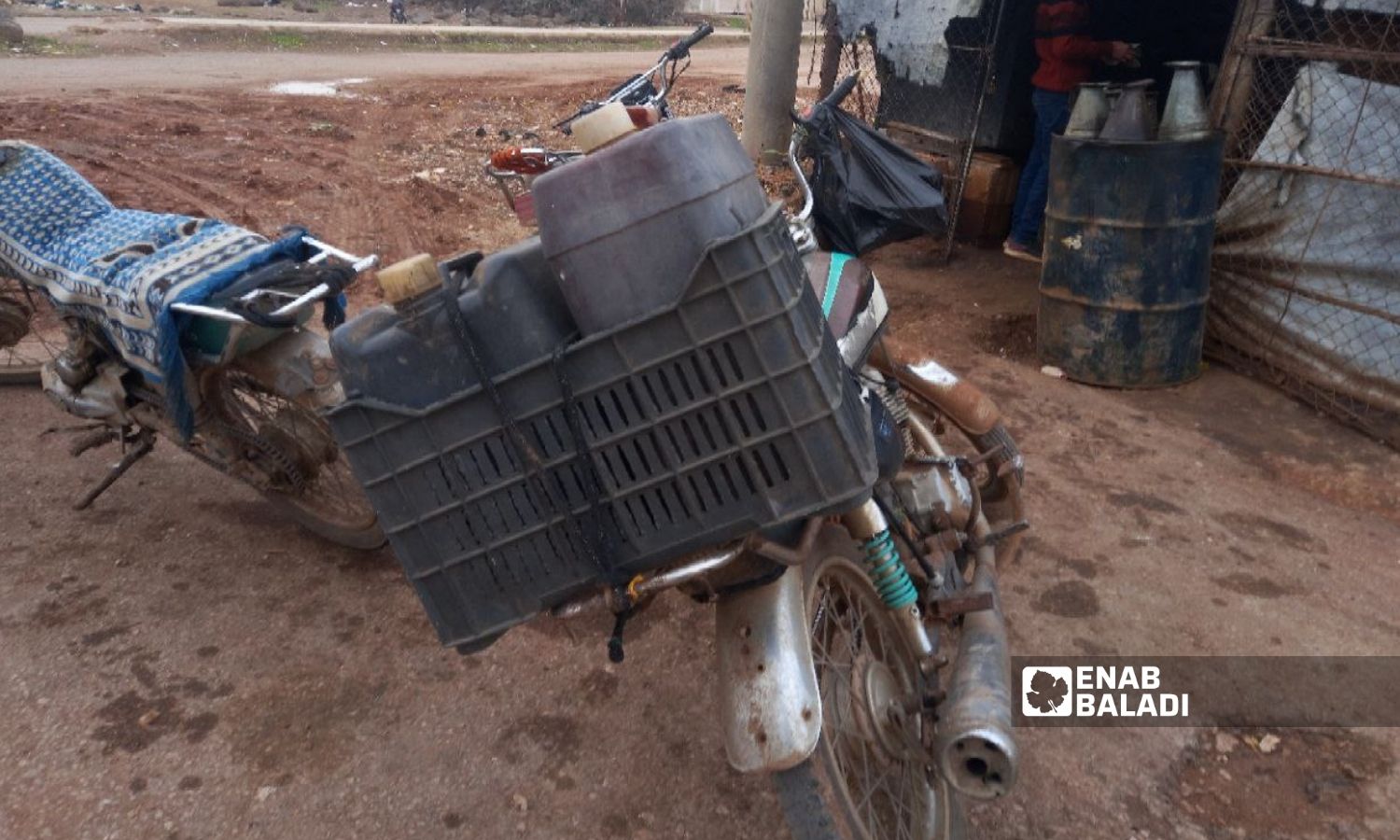



Daraa – Halim Muhammad
The high price of diesel fuel in Daraa was reflected in the fares for transporting foodstuffs, building materials, and other products that the southern governorate exchanges with other parts of Syria, while the royalties imposed by the Syrian regime’s checkpoints on passing cars exacerbated the cost of materials to the consumer.
The merchants use these factors as an excuse to justify the frequent increases in prices, which mainly affect citizens’ lives with the decline in the value of the Syrian pound, as its exchange rate reached 5,880 SYP per 1 USD, according to the Syrian Pound Today website.
The price of a liter of unsubsidized diesel in Daraa has reached 9000 pounds after it was only 6,500 pounds last November.
Alaa, 42, a seller in a food store, said prices in Daraa are constantly increasing, and this matter is linked to the price of diesel fuel, which has raised manufacturing and transportation costs.
Alaa, Enab Baladi withheld his full name for security reasons, added that the prices of commodities are not fixed, as they are constantly rising every hour, according to the local diesel price bulletin.
Jaber, 45, a farmer in the Daraa countryside, told Enab Baladi that the fees for transporting agricultural products have risen, expressing his fear of an expected loss after the high costs of agriculture and the costs of transporting produce on the one hand and the high costs of cultivating the land and other agricultural mechanization and watering the crops on the other hand.
He added that the fare for a car transporting vegetables to the central al-Hal market in Damascus now ranges between 700,000 and 800,000 Syrian pounds.
In turn, Anas, 35, a worker in a sand and gravel quarry, told Enab Baladi that the prices of building materials rose with the increase in the price of diesel, and the price of a meter of gravel and sand reached 85,000 SYP after it was 60,000 during the past month.
The prices of clothes, foodstuffs, and others have also risen, describing diesel as the “pulse of life” and that it is linked to all aspects of the economy in Daraa, Anas added.
Iman, 25, a university student, described to Enab Baladi her suffering with regard to high transportation costs, as the fare for a passenger from Daraa to Damascus reached about 15,000 Syrian pounds, noting that bus drivers justify that “the diesel allocations are subsidized and not enough, and the fuel on the black market is expensive.”
The regime-held areas are witnessing a fuel crisis, despite government promises to solve it.
The regime’s Oil Minister, Bassam Tohme, justified the poor reality of fuel by the government’s reliance on supplies that are largely governed by international and environmental conditions, explaining that the crisis has been going on for about two months, linking the relief of the crisis to the regularity of supplies.
According to Tohme, the ministry does not have enough fuel to allow it to form a strategic stockpile to meet the long supply shortages because the largest tankers that arrive, which contain a million or two million barrels of oil, for example, are sufficient for days only.
The cost of transporting goods is not limited to diesel prices, as the royalties imposed by the regime’s checkpoints constitute an additional pressure factor that contributes to raising transportation fares.
Munther, 50, the owner of an agricultural vehicle, pays different amounts to the military checkpoints, saying, “Some checkpoints impose 5000 pounds and some 2000 pounds.”
Munther, who declined to reveal his full name for security reasons, justified paying the ‘royalties’ to avoid long waiting hours, unloading the goods for the check, and the consequent hard work that may require workers or lead to damage to the loaded goods, which costs money and time.
The driver adds the sums he pays to the checkpoints to the cost of transportation, which is reflected in the prices of materials in general.
Regarding the reason for the presence of royalties among the checkpoint personnel, a defected non-commissioned officer, who requested anonymity for security reasons, justified that the regime’s checkpoints are currently depending on illegal royalties as the salary of a conscript is no longer enough to pay transportation fees.
On the other hand, disregarding the checkpoints for inspecting cars leads to the risks of smuggling drugs, weapons, or counterfeit currency.
if you think the article contain wrong information or you have additional details Send Correction